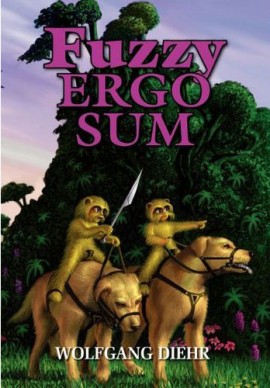Review: 'Fuzzy Ergo Sum' by Wolfgang Diehr

“Fuzzy Ergo Sum”, by Wolfgang Diehr
Boalsburg, PA, Pequod Press, March 2011
Hardcover $38.00 (299 pages), Kindle $7.99
H. Beam Piper’s “Little Fuzzy”, about the discovery by humans of cute furry natives on the planet Zarathustra, was first published in 1962. It became a minor classic, being nominated for the Hugo Award for Best Novel in 1963, and inspiring four other Fuzzy novels up to 1982.
Two of those not by Piper were later declared to be “not canon”, and Piper’s three Fuzzy novels were published together in 1998 as “The Complete Fuzzy”. As soon as the copyright on “Little Fuzzy” expired in 2006, numerous public domain editions were published in paperback and Kindle, and on the Internet by Project Gutenberg.
Now a new Fuzzy novel has been written by Wolfgang Diehr, a Piper fan who moderates the Piper Worlds discussion group on Yahoo.com. Diehr wrote the novel over three years with the editorial assistance of John F. Carr, the Piper expert who edited many of the Piper reprint collections for Ace Books in the early 1980s, and Carr has published Diehr’s novel through his Peqoud Press.
“Fuzzy Ergo Sum” is a “fourth” Fuzzy novel, following up on the events in “Little Fuzzy”, “Fuzzy Sapiens”, and “Fuzzies and Other People”. It is good enough that it will please Piper’s fans, yet it is definitely for readers who know the Fuzzy canon and the previously-established cast. It takes place shortly after the events in “Fuzzies and Other People”, a little more than two years since the Fuzzies were first discovered. Jack Holloway, Victor Grego, Little Fuzzy and his family, and the other familiar characters are all here. Zarathustra's new civil government has been established and developed a friendly working relationship with the still-powerful Charterless Zarathustra Company. The humans and Fuzzies are living in harmony.
But a novel requires conflict. “Fuzzy Ergo Sum” may provide too much of it. John Morgan, an apparently friendly but Mysterious Stranger, comes to Zarathustra from the Terran Federation planet Freya and involves himself in the executive levels of the CZC. Almost simultaneously, Colonial Chief Prosecutor Gustavus Brannhard (one of the original Good Guys) is kidnapped by unknown criminals.
At the same time, an unidentified group sets up a clandestine mining operation in the wilds of Beta continent, at first seemingly to poach for sunstones but (as the plot develops) for an apparently more convoluted motive. This group comes into contact with a tribe of Fuzzies who have not encountered humans before, leading to potential conflict. And if this weren’t enough, a cryptic scheme is hatched by offworld and local criminals to spring one of Zarathustra’s most notorious villains from prison. The novel balances all of these elements skillfully, switching back and forth from one to another, keeping the main characters and the reader guessing which if any are connected to each other; but the result is to make each of the subplots seem to take a back seat to an amorphous whole. All the cast feel like supporting characters; nobody really stands out as a main protagonist.
Diehr shows clear familiarity with the other Fuzzy novels, giving important roles to all the previous players and introducing several new ones. He adds intriguing new details to what is known about Zarathustra and Freya, and to what humans learn about Fuzzy biology. Probably his most picturesque creation is the patrols of Fuzzy “dog riders”:
“Eighteen months earlier Sandra Khadra noticed two Fuzzies riding on the back of a large mixed breed dog and mentioned it to Victor Grego, Jack Holloway and Ben Rainsford at a dinner party. That started a discussion about the merits of Fuzzy-mounted dogs since Zarathustra lacked for any animal that could do the job of a horse, especially for the diminutive natives. Eventually, it was decided to bring in a number of breeding pairs of sturdy dogs and train them as ‘horses’ for Fuzzies.” (pgs. 130-131. See also the attractive wraparound dust jacket by Alan Gutierrez.)
Readers will be favorably surprised by how Diehr works back in a plot device from the now non-canon novels by William Tuning and Ardath Mayhar. One minor annoyance is poor proofreading; Pancho Ybarra is “Poncho” Ybarra more often than not. The main dissatisfaction here is that, unlike Piper’s adventures which each comes to a satisfying conclusion, “Fuzzy Ergo Sum” ends on a dramatic cliffhanger. There is clearly more of the story to come. Fuzzy fans will hope that the wait is not too great.
About the author
Fred Patten — read stories — contact (login required)a retired former librarian from North Hollywood, California, interested in general anthropomorphics
Comments
It's good to see new writers revive old franchises, as long as they don't trample all over the original author's intentions.
However, $38 is a fair chunk of change, especially for half a story. I imagine if people get this anytime soon, it'll be on the Kindle.
A common practice in the publishing world is to print a novel's more expensive hardcover edition first, and a cheaper paperback edition one year later.
Yes, but John Carr's Pequod Press is not a big commercial publisher with regular paperback distribution, so a paperback edition of "Fuzzy Ergo Sum" cannot be automatically assumed.
Fred Patten
Post new comment